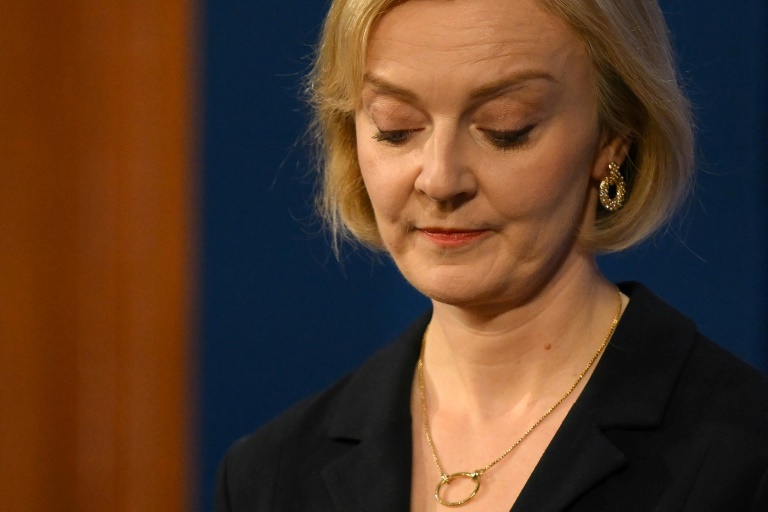YouGov found that within six weeks of taking power Liz Truss has become the most unpopular leader it has ever tracked
The UK’s hardline interior minister Suella Braverman quit the government on Wednesday, heaping more doubt on the survival chances of Prime Minister Liz Truss after her right-wing economic agenda unravelled.
Braverman said she had resigned after using her personal email to send an official document to a colleague.
While calling it a “technical infringement” of government rules, she wrote in her resignation letter: “I have made a mistake; I accept responsibility; I resign.”
Within hours, Truss’s office announced that she would be replaced by Grant Shapps, a former transport minister under ex-premier Boris Johnson.
Shapps pledged to work to achieve “the sort of security that the British people need”.
He said he accepted that Truss’s government has had “a very difficult period” but that new finance minister Jeremy Hunt had done “a great job of settling the issues relating to that mini budget.”
Truss has faced widespread criticism for failing to step down herself, after forcing her finance minister Kwasi Kwarteng to take the blame for a disastrous budget.
The government’s September 23 mini-budget — which slashed a host of taxes without curbing spending — sent bond yields spiking and the pound collapsing to a record dollar low on fears of rocketing UK debt.
Braverman said in her resignation letter that she had “serious concerns” the prime minister was breaking manifesto promises.
“Pretending we haven’t made mistakes, carrying on as if everyone can’t see we’ve made them, and hoping things will magically come right is not serious politics,” she wrote.
Braverman spent just 43 days in the role of home secretary, and her departure is the latest crisis unleashed by the government’s budget.
– ‘Fighter not a quitter’ –
The 54-year-old Shapps who will replace her is famed in government circles for his use of Excel spreadsheets, and threw his hat into the ring — along with Braverman — to replace his old boss, Johnson.
He promised tax cuts and competent government and was widely seen as an effective communicator and campaigner, although a long shot as Conservative leader.
Despite the chaos engulfing her government, Truss vowed earlier Wednesday that she would not quit as she faced booing lawmakers at her first parliamentary questions since abandoning her flagship plan.
Opposition Labour leader Keir Starmer asked the House of Commons: “What’s the point of a prime minister whose promises don’t even last a week?”
Starmer mocked Truss by leading his MPs in chants of “Gone, gone!” as he read out a list of her dropped policies.
“Why is she still here?” he concluded.
Truss responded: “I am a fighter and not a quitter”.
But there was silence on her own Conservative benches as Truss issued her riposte to Starmer.
The session took place less than 48 hours after new finance minister Hunt dismembered Truss’s tax plans in a humiliating blow.
He sat at her side in parliament, nodding at her responses.
At least five MPs from Truss’ Conservative party have already publicly called for her to be replaced.
Polls show Truss’s personal and party ratings have plummeted, with YouGov saying Tuesday that she had become the most unpopular leader it has ever tracked.
A separate survey of party members found that less than two months after electing her as Tory leader and prime minister, a majority now think she should go.
Labour has opened up huge poll leads over the ruling Conservatives, amid the recent fallout as well as the worsening cost-of-living crisis, with inflation jumping above 10 percent on Wednesday on soaring food prices.
– ‘Eye watering’ –
Truss last week staged two mini-budget U-turns, scrapping planned tax cuts for the richest earners and on company profits, while firing her close ally Kwarteng.
After appointing Hunt as his successor, she agreed to further reverse course — axing almost all the other cuts and partially rowing back on energy price support for consumers.
Hunt’s warnings of further “eye watering cuts” prompted reports that the government could stop indexing current pensions to inflation, breaking another manifesto commitment.
But Truss said in parliament that she would maintain the costly pensions commitment.
During the summer leadership campaign, when Truss beat former chancellor of the exchequer Rishi Sunak to succeed ex-premier Boris Johnson, she vowed not to reduce public spending.
But after the economic tumult of recent weeks, Truss and Hunt have warned of “difficult decisions” and urged government departments to find savings.
Opposition parties are demanding she stand down and a general election — not due for two years — be held.
Under current party rules Truss cannot be challenged by a no-confidence vote in her first year, but speculation is rife the rules could be changed to allow for a ballot.










